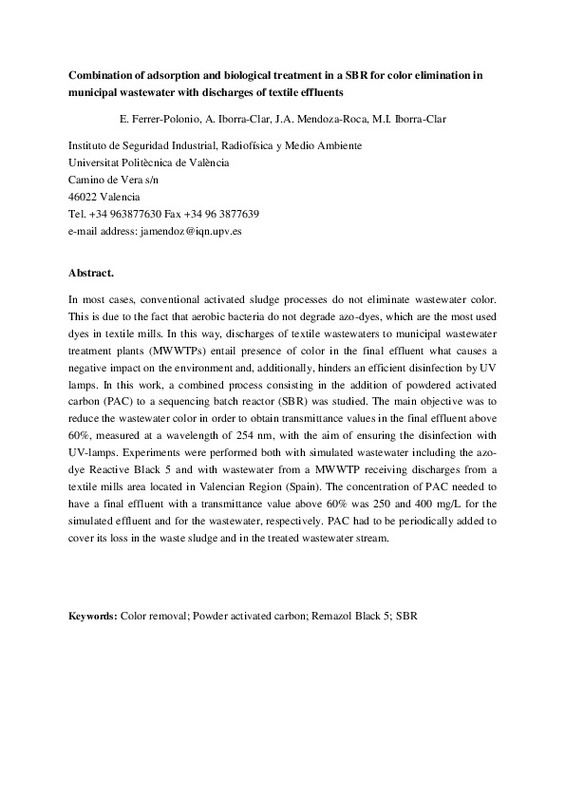JavaScript is disabled for your browser. Some features of this site may not work without it.
Buscar en RiuNet
Listar
Mi cuenta
Estadísticas
Ayuda RiuNet
Admin. UPV
Combination of adsorption and biological treatment in a SBR for colour elimination in municipal wastewater with discharges of textile effluents
Mostrar el registro sencillo del ítem
Ficheros en el ítem
| dc.contributor.author | Ferrer-Polonio, E.
|
es_ES |
| dc.contributor.author | Iborra Clar, Alicia
|
es_ES |
| dc.contributor.author | Mendoza Roca, José Antonio
|
es_ES |
| dc.contributor.author | Iborra Clar, María Isabel
|
es_ES |
| dc.date.accessioned | 2016-09-28T07:28:56Z | |
| dc.date.available | 2016-09-28T07:28:56Z | |
| dc.date.issued | 2014-08-14 | |
| dc.identifier.issn | 1944-3994 | |
| dc.identifier.uri | http://hdl.handle.net/10251/70541 | |
| dc.description.abstract | ischarge of textile wastewaters (WW) to municipal wastewater treatment plants (MWWTPs) entails the presence of colour in the final effluent. It causes a negative impact on the environment and, additionally, hinders an efficient disinfection by UV lamps. In this work, a combined process consisting of the addition of powdered activated carbon (PAC) to a sequencing batch reactor was studied. The main objective was to reduce WW colour in order to obtain transmittance values in the final effluent above 60%, measured at a wavelength of 254 nm, with the aim of ensuring disinfection with UV lamps. Experiments were performed with both simulated wastewater (SWW) including the azo dye Reactive Black 5 and WW from a MWWTP receiving discharges from textile mills. Biosorption increased the transmittance of the effluent around 25% for SWW and 24% for WW, in comparison with the values measured in the influent. The PAC concentrations for the achievement of a value of 60% in the transmittance of the treated water were 250 and 400 mg/L for the simulated effluent and for the WW, respectively. PAC had to be periodically added in order to cover its loss in the waste sludge. | es_ES |
| dc.description.sponsorship | Authors thank Depuracion de Aguas del Mediterraneo S.A. for its support in the work. | en_EN |
| dc.language | Inglés | es_ES |
| dc.publisher | Taylor & Francis | es_ES |
| dc.relation.ispartof | Desalination and Water Treatment | es_ES |
| dc.rights | Reserva de todos los derechos | es_ES |
| dc.subject | Powder activated carbon | es_ES |
| dc.subject | Remazol Black 5 | es_ES |
| dc.subject | Colour removal | es_ES |
| dc.subject | SBR | es_ES |
| dc.subject.classification | INGENIERIA QUIMICA | es_ES |
| dc.title | Combination of adsorption and biological treatment in a SBR for colour elimination in municipal wastewater with discharges of textile effluents | es_ES |
| dc.type | Artículo | es_ES |
| dc.identifier.doi | 10.1080/19443994.2014.929979 | |
| dc.rights.accessRights | Abierto | es_ES |
| dc.contributor.affiliation | Universitat Politècnica de València. Instituto de Seguridad Industrial, Radiofísica y Medioambiental - Institut de Seguretat Industrial, Radiofísica i Mediambiental | es_ES |
| dc.contributor.affiliation | Universitat Politècnica de València. Departamento de Ingeniería Química y Nuclear - Departament d'Enginyeria Química i Nuclear | es_ES |
| dc.description.bibliographicCitation | Ferrer-Polonio, E.; Iborra Clar, A.; Mendoza Roca, JA.; Iborra Clar, MI. (2014). Combination of adsorption and biological treatment in a SBR for colour elimination in municipal wastewater with discharges of textile effluents. Desalination and Water Treatment. 55(7):1915-1912. doi:10.1080/19443994.2014.929979 | es_ES |
| dc.description.accrualMethod | S | es_ES |
| dc.relation.publisherversion | http://dx.doi.org/10.1080/19443994.2014.929979 | es_ES |
| dc.description.upvformatpinicio | 1915 | es_ES |
| dc.description.upvformatpfin | 1912 | es_ES |
| dc.type.version | info:eu-repo/semantics/publishedVersion | es_ES |
| dc.description.volume | 55 | es_ES |
| dc.description.issue | 7 | es_ES |
| dc.relation.senia | 279735 | es_ES |
| dc.identifier.eissn | 1944-3986 | |
| dc.contributor.funder | Depuración de Aguas del Mediterráneo, S.L. | es_ES |






![[Cerrado]](/themes/UPV/images/candado.png)


